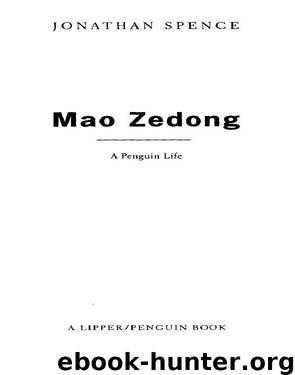Mao Zedong by Jonathan Spence

Author:Jonathan Spence
Language: eng
Format: epub
Publisher: Penguin USA, Inc.
8
Taking Over
IN THE MIDSUMMER OF 1945, no one in China guessed that the war with Japan was just about to end. Because security in Chongqing was so poor, and the Communists were politically suspect, the Chinese were not told about the American development of the atomic bomb. Besides which, even the Americans could not predict the precise effect of the atomic bombs they were to drop on Hiroshima and Nagasaki on the sixth and ninth of August, nor how soon after that the Japanese emperor would order his armies to lay down their arms, as he did on the fourteenth. Nationalists and Communists had contingency plans, of course: the Nationalists planned for a slow military advance to the east coast around Canton, spearheaded by their best American-trained divisions, to be followed by a drive north up to Shanghai and Nanjing (roughly parallel to the military advances of 1926 and 1927 in the first United Front); the Communists planned to deepen the extent of their sprawling base areas in the north, speed up land redistribution and mass mobilization, strengthen the Party organizations in the northern provinces of Shandong and Hebei, and endeavor to set up effective underground organizations in the major cities. Again, neither side could guess that Manchuria—where both Nationalists and Communists had weak or nonexistent military and political presences—would turn out to be the key to ultimate victory. When the Soviet Russian armies invaded Manchukuo on August 8, it was in response to promises they had made to Churchill and Roosevelt at Yalta that they would enter the China theater war three months after Germany’s surrender—which had happened on May 8, 1945. But neither Yan‘an nor Chongqing had been informed of the Yalta agreements, again for reasons of long-term strategic security.
It was a chance of geography as much as anything else that helped the Communists at this stage. From their Yan‘an base, their Shanxi-Chahar-Hebei border region, and their strong guerrilla units based in Shandong province, they could move troops into Manchuria far faster than the Nationalists could, and Mao decided to take the gamble and attempt to occupy the huge region, so rich in mineral and forestry resources, though sparsely inhabited compared with the heartland of China proper. And as soon as the Communists learned of the Japanese surrender, they began to do so. They were aided considerably by the Soviet armed forces, who allowed the Chinese to take over the gigantic Japanese stockpiles of arms and ammunition in the key railroad city of Kalgan, just south of the Great Wall in Chahar. In several Inner Mongolian cities the Soviet troops first subdued and disarmed the Japanese, and then retreated, allowing the Chinese to come in unopposed. In some areas the Russians gave Japanese arms and vehicles directly to the Chinese, and in at least one case, the Russians and Chinese fought side by side to seize a key border city. Russian logistical help was equally great, with as many as 100,000 Chinese Communist troops and 50,000 political workers
Download
This site does not store any files on its server. We only index and link to content provided by other sites. Please contact the content providers to delete copyright contents if any and email us, we'll remove relevant links or contents immediately.
| Central Asia | Southeast Asia |
| China | Hong Kong |
| India | Japan |
| Korea | Pakistan |
| Philippines | Russia |
The Sympathizer by Viet Thanh Nguyen(4390)
The Rape of Nanking by Iris Chang(4213)
World without end by Ken Follett(3477)
Ants Among Elephants by Sujatha Gidla(3467)
Blood and Sand by Alex Von Tunzelmann(3203)
Japanese Design by Patricia J. Graham(3175)
The Queen of Nothing by Holly Black(2599)
City of Djinns: a year in Delhi by William Dalrymple(2555)
Foreign Devils on the Silk Road: The Search for the Lost Treasures of Central Asia by Peter Hopkirk(2464)
India's Ancient Past by R.S. Sharma(2454)
Inglorious Empire by Shashi Tharoor(2438)
Tokyo by Rob Goss(2429)
In Order to Live: A North Korean Girl's Journey to Freedom by Yeonmi Park(2392)
Tokyo Geek's Guide: Manga, Anime, Gaming, Cosplay, Toys, Idols & More - The Ultimate Guide to Japan's Otaku Culture by Simone Gianni(2373)
India's biggest cover-up by Dhar Anuj(2354)
The Great Game: On Secret Service in High Asia by Peter Hopkirk(2349)
Goodbye Madame Butterfly(2253)
Batik by Rudolf Smend(2184)
Living Silence in Burma by Christina Fink(2071)
